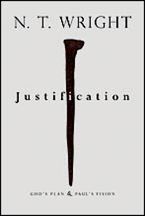N. T. Wright: Justification
 N. T. Wright, Justification: God’s Plan and Paul’s Vision (Downers Grove, IL: IVP Academic, 2009), 279 pages, ISBN 9780830838639.
N. T. Wright, Justification: God’s Plan and Paul’s Vision (Downers Grove, IL: IVP Academic, 2009), 279 pages, ISBN 9780830838639.
Justification is N. T. Wright’s response to John Piper’s critique of several of Wright’s earlier writings. If those earlier writings from Wright are installments in a program, Justification is the program’s hub—the point at which it all comes together, and at which the program is presented in a most easily understandable form. (Wright informs us, however, that a more programmatic hub is forthcoming in the form of a “big book” on Paul.)
This book towers in presence and importance over Wright’s other popularizing works. In the context of theological books aimed at a lay readership, it towers above most of the land as well—it is (at least) a sort of “book of the year”. While scholars who write repeatedly for lay readers tend to let their academic guard down, Wright remains rigorous throughout this book, perhaps because he is writing in response to parties who will call him on the carpet for any slip.
Given the book’s popularizing and argumentative bent, it seems, at points, to be more invested in rhetoric than in substance. Wright harps a bit too much (in this reader’s opinion) on how traditional Reformed soteriology is usually couched in terms of “me and my salvation”, rather than in terms of what God is doing on a more cosmic scale. (Wright insists that God’s salvation is so much more than “personal” salvation.) While Wright’s point is not completely invalid, he presses it too far. After all, should we not expect Paul to tailor his message to people asking about “me and my salvation”? Are we to believe that the ancients did not think in those terms, and that Paul would not have reacted accordingly? My point is that Wright tries to make this rhetoric lift more than it can, and he should have made at least some effort to establishing his point exegetically, especially since he makes such a big deal of doing so on all other points. Other aspects of Wright’s rhetoric are measured out more advisedly. His constant insistence on reading Scripture on its own terms rather than through the lens of tradition is fair and especially fitting, all the more so given the context of the debate with Piper. Wright insists on letting Paul speak for himself.
Wright connects “justification” to (just about) all that God did to redeem creation, but the term itself, he claims, refers only to the lawcourt-drama aspect of salvation. The lawcourt image is but a metaphor, and God’s salvation consists of so much more. God’s focus is on redeeming all of creation. Given this supposition, Wright’s attempt to remove the term from a narrow focus on personal salvation (esp. the courtroom drama) is understandable. Wright ties everything back to God’s covenant with Abraham, which, on his account, comprises the center of all God’s redeeming activity. Most parts of his argument, I think, are convincing, and he especially convinces in overturning others’ attempts to treat Abraham’s role in Romans 4 as merely an example of how God’s salvation works. Another strong part of Wright’s overall program is found in his constant reminder that the “we” in Paul’s arguments often refers to the apostles rather than to believers in general. Wright establishes this point conclusively, I think, in a brilliant exegesis of 2 Corinthians 5, showing that the apostles, rather than the Corinthians (or Christians in general), are the “ministers of reconciliation”. Perhaps the weakest point of Wright’s overall program lies in his attempts to find exodus typology under every stone. (He even thinks that water baptism typologically recalls the exodus.)
Category: Fall 2011, In Depth, Pneuma Review


